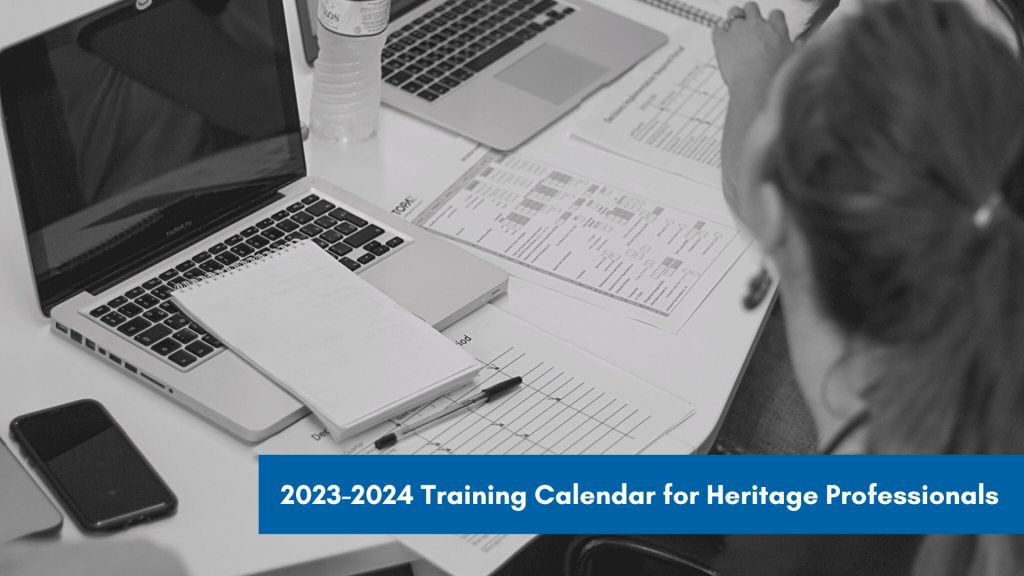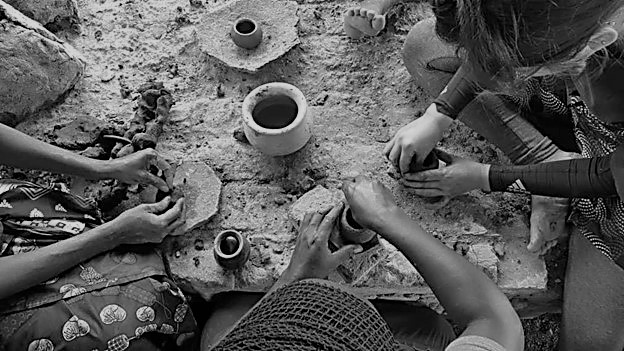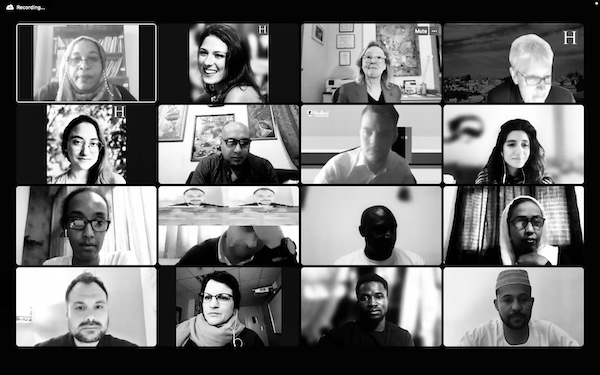Tag Archives: online
2023-2024 Training Calendar for Heritage Professionals
 Introduction to Heritage Interpretation for Site Managers | 6 – 8 October 2023
Introduction to Heritage Interpretation for Site Managers | 6 – 8 October 2023
Transform a visit into a captivating experience. Acquire the skills to create meaningful and unforgettable experiences for visitors, during this 3-day online workshop. Only accepting last-minute waiting list applications.
Project Management for Heritage Managers | 7 – 9 October (US only) & 9 – 10 December 2023
This intensive 3-day online workshop led by Tim Healing will show participants the way to run a successful project from inception through planning to implementation and closure. A special US pilot program is still accepting last-minute applications.
Engaging Communities in Cultural Heritage | 27 – 29 October 2023
During this 3-day workshop, we aim to develop a different approach to community engagement based on social (and art) research with community-led initiatives. By adopting a research-led approach, we can foster collaborative design and actions that truly resonate with the unique cultural and social dynamics of each specific group or community, as well as their interactions with others. We will explore methodologies grounded in ethnography and oral history, while also engaging in practical exercises to reinforce learning.
Interpretive Writing for Natural and Cultural Heritage | 10 – 12 November 2023
Written text that grabs and holds the visitor’s and reader’s attention is the key to effective word-based heritage interpretation. During this 3-day online workshop with Steven Richards-Price you will discover and practice a wide range of techniques to engage visitors and master the techniques of interpretive writing.
Climate Change, Community Engagement & Interpretation | 1-3 December 2023
Brand new, 3-day workshop on climate change, heritage interpretation, and community engagement that seeks to empower participants with the tools and skills necessary to engage local communities in climate action through the lens of heritage interpretation.
Temporary Exhibition Design: Agile Exhibitions in a rapidly changing environment | 2-4 February 2024
This up-to-date 3-day workshop focuses on how temporary exhibitions can enhance and promote an institution’s mission, create new audiences and generate revenue, from building an institutional strategy for exhibitions and partnership-building to planning and putting on temporary exhibitions for display at home and on tour. Attendees are encouraged to bring their own ideas and projects to the workshop and time is allocated for 1:1 consultation with the workshop facilitators.
Community and Economic Development | 16-18 February 2024
Cultural heritage managers increasingly have to both demonstrate and create economic benefits for local, regional, and national economies. This workshop will provide attendees with a firm understanding of the motivations for mobilizing cultural resources for economic benefit; the limits of that mobilization; different strategies for creating economic benefits; and how economic impacts are measured and communicated. The workshop will then guide attendees through the development of a plan for the creation of economic benefits for their own case studies, including the development of goals; selecting appropriate strategies; judging economic feasibility; and monitoring and evaluation procedures. As a result of the course attendees will be able to implement economic development strategies in their own community.
Communication Strategy & Strategic Marketing for Cultural Organizations | 8-10 March 2024
You have organized the best exhibition of the year or set up a ground-breaking educational program. You have worked hard with curators, conservators, educators, and everything is ready to rock, but now you wonder… how can I bring people in? How can I reach my audience, and what should I be telling them? This 3-day course is a focused learning experience that provides a systemic approach to successfully attract key audiences’ attention through traditional, new, and social media.
Fundraising for Cultural Heritage Organizations | 22 – 24 March 2024
This 3-day workshop provides a survey of fundraising strategies and skills needed to start-up and build an organization’s contributed revenue with the aim of increasing its impact in the world. Participants learn best practices and apply them to create the case for support and letter of inquiry for their own organization or project.
Conservation II: First Aid for Finds | 12-14 April 2024
The workshop will provide step-by-step instruction on the best practices in the care of freshly excavated archaeological and historic objects as well as in the care of objects belonging to collections that have just been damaged. It will also examine the case of providing first aid measures to architectural heritage. It will go through all the processes that are essential during preparation, application of treatments and monitoring.
Strategic Planning for Heritage Managers| 26 – 28 April 2024
Strategy is a key factor for success in all areas of human activity. This 3-day interactive course aims to provide the tools and methodologies to effectively address the topics of successful strategy formulation and implementation in organizations managing cultural heritage in today’s complex environment.
Conservation I: Introduction to the General Principles of Cultural Heritage Conservation | 24 – 26 May 2024
Following the success of your first Conservation workshop in 2023, we are again accepting applications for this 3-day interactive course that aims to teach the principles and objectives of conservation, and in so doing to introduce its methodology. The workshop will deliver the fundamentals, the ethics, the evolution, and the contemporary international context of conservation.
HERITΛGE provides scholarships to most participants in its training programmes. These scholarships can cover up to 90% of the cost of attendance, depending on the circumstances of the participants and the availability of funding. On average, participants contribute around 300 euros to attend one of our 3-day training workshops.
Launching a new Conservation Workshop!
HERITΛGE is happy to announce the launch of a new introductory conservation workshop, designed to equip heritage professionals with the skills and knowledge they need to extend the life of cultural heritage while enhancing the transmission of its messages and values.
Conservation is critical to preserving the physical and cultural characteristics of heritage objects, and ensuring their value is not diminished. Our new 3-day introductory course provides an overview of the principles and objectives of conservation, outlining its methodology, ethics, evolution, and contemporary international context.
“This course is an introduction to the principles of conservation and as such, it is a unique opportunity for our organization to place conservation at the heart of heritage management,” said HERITΛGE Director, Dr. Evangelos Kyriakidis.
Led by Alexis Stefanis, an Assistant Professor at the Department of Conservation of Antiquities and Works of Art of the University of West Attica, Greece, the HERITΛGE conservation workshop is a unique opportunity for heritage professionals to place conservation at the heart of heritage management.
By the end of the course, participants will have gained an understanding of the potential of conservation, and the processes necessary to maximize it. Funding opportunities are available for eligible participants.
Find out more about the workshop, funding opportunities, and the application process here.
Successful Fundraising for Heritage Managers: Strategies and Best Practices
On March 17-19, 2023, a three-day online workshop on “Successful Fundraising for Heritage Managers: Strategies and Best Practices” was held, aimed at equipping heritage managers with fundraising skills and strategies to start-up and build their organizations’ contributed revenue for increased impact in the world. The workshop had 13 participants from Africa (Egypt, Ethiopia, Kenya, Namibia, Sudan), Asia (India), and Europe (Greece, Norway, Serbia, United Kingdom), who were trained on fundraising best practices.
Throughout the workshop, participants learned the best practices on fundraising and how to apply them to create a case for support and a letter of inquiry for their own organization or project. The participants brought to the workshop various projects that they wanted to raise funds for.
These included:
• The Dye House at NMEC,Egypt
• Prosfygika Project, Squatted Monuments in the city center of Athens, Greece
• Creating a Cultural Trail for a Regeneration Site in East London, United Kingdom
• Restoration of Stepwells at Penukonda, India
• Documentation and protection of the abundant village of Old Dongola Sudan
• Identification, Documentation and Marketing of Intangible Cultural Heritage of Esna, Egypt
• City Tour Guide’s Capacity Building Training, Ethiopia
• Heritage Interpretation of Prehistoric Sites, Kenya
• SEE Heritage Network going strong, Serbia
• Systematic excavation, preservation, and documentation of the Meroitic townsite of Kedurma,
Sudan
• Traditional Farming in the Butana area, ethnoarchaeological study, Sudan
• Rundu Youth Academy of Arts, Namibia
• Fotefar mot nord – Trails to the north, Norway.
The workshop had both asynchronous and live sessions. During the asynchronous sessions, participants prepared for an assignment in advance and were updated with reading material and pre-recorded videos on the Moodle platform. In the live sessions, participants presented their assignments and received feedback from instructors. The live sessions were then followed by lectures from workshop instructors.
Participants were also given free access for one month to GrantStationhttps://grantstation.com/ to look for potential prospects for their project, thanks to GrantStation for kindly providing discounted access to participants. Through the workshop sessions, lectures, case studies, various discussions, and interactive exercises, participants were able to develop and apply strategies in fundraising fundamentals, best practices, ethics, working with executive and voluntary leadership, creating and articulating a compelling case for support prospect research, matching projects with sources of support, matching marketable projects with prospective sources of support, identifying, cultivating and soliciting prospects, personally asking for a contribution, securing foundation and corporate grants, writing a compelling letter of inquiry to an actual potential funder, creating a development plan.
On March 27, the participants had a follow-up tutorial, where they met with their instructors to ask questions and receive guidance on how to improve their final project, which is to write a letter of inquiry for their own project. The workshop was a success as the participants left equipped with the skills and strategies needed to fundraise for their various heritage projects.
Workshop Instructors:
Linda C. Hartley, is principal, H2Growth Strategies and former VP of External Affairs at The
Cooper Union for the Advancement of Science and Art. She taught as an adjunct professor for
12 years at the NYU Heyman Center for Philanthropy and Fundraising, and is co-author of the
book, Big Impact: Insights & Stories From America’s Non-Profit Leaders. Hartley holds an M.B.A.
in Management from the Stern School of Business at New York University.
Jennifer E. Herring, is special advisor, H2Growth Strategies, former President & CEO of the
Maritime Aquarium, and former Senior VP of Development of the Wildlife Conservation Society.
Herring currently serves as VP for Development of STEMteachers NYC. She holds an M.A. in
Liberal Studies from SUNY Stony Brook and a certificate in Strategic Perspectives in Nonprofit
Management from Harvard Business School.


